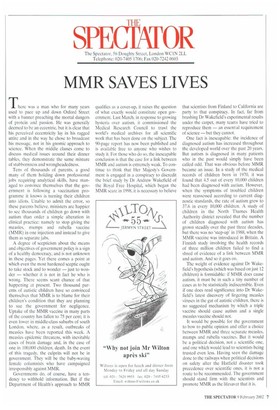SPECtATOR
The Spectator, 56 Doughty Street, London WC1N 2LL Telephone: 020-7405 1706; Fax 020-7242 0603
MMR SAVES LIVES
There was a man who for many years used to pace up and down Oxford Street with a banner preaching the mortal dangers of protein and passion. He was generally deemed to be an eccentric, but it is clear that his perceived eccentricity lay in his ragged attire and in the way he chose to broadcast his message, not in his gnomic approach to science. When the middle classes come to discuss medical issues around their dinner tables, they demonstrate the same mixture of stubbornness and wrongheadedness.
Tens of thousands of parents, a good many of them holding down professional jobs requiring analytical skills, have managed to convince themselves that the government is following a vaccination programme it knows is turning their children into idiots. Unable to admit the error, so these parents believe, ministers are happier to see thousands of children go down with autism than order a simple alteration in clinical practice: namely to stop giving the measles, mumps and rubella vaccine (MMR) in one injection and instead to give them as separate jabs.
A degree of scepticism about the means and objectives of government policy is a sign of a healthy democracy, and is not unknown in these pages. Yet there comes a point at which even the most hardened sceptic ought to take stock and to wonder — just to wonder — whether it is not in fact he who is wrong. There seems scant chance of that happening at present. Two thousand parents of autistic children have so convinced themselves that MMR is to blame for their children's condition that they are planning to sue the government for negligence. Uptake of the MMR vaccine in many parts of the country has fallen to 75 per cent; it is even lower in middle-class suburbs of south London, where, as a result, outbreaks of measles have been reported this week. A measles epidemic threatens, with inevitable cases of brain damage and, in the case of one in 100,000 children, death. In the event of this tragedy, the culprits will not be in government. They will be the baby-waving female columnists who have campaigned irresponsibly against MMR.
Governments do, of course, have a tendency to withhold information. But if the Department of Health's approach to MMR qualifies as a cover-up, it raises the question of what exactly would constitute open government, Last March, in response to growing hysteria over autism, it commissioned the Medical Research Council to trawl the world's medical archives for all scientific work that has been done on the subject. The 90-page report has now been published and is available free to anyone who wishes to study it. For those who do so, the inescapable conclusion is that the case for a link between MMR and autism is extremely weak. To continue to think that Her Majesty's Government is engaged in a conspiracy to discredit the brief study by Dr Andrew Wakefield of the Royal Free Hospital, which began the MMR scare in 1998, it is necessary to believe that scientists from Finland to California are party to that conspiracy. In fact, far from brushing Dr Wakefield's experimental results under the carpet, many teams have tried to reproduce them — an essential requirement of science — but they cannot.
One fact is inescapable; the incidence of diagnosed autism has increased throughout the developed world over the past 20 years. But autism is diagnosed in many patients who in the past would simply have been called odd. That was obvious before MMR became an issue. In a study of the medical records of children born in 1970, it was found that 4.5 out of every 10,000 children had been diagnosed with autism. However, when the symptoms of troubled children were reassessed according to current diagnostic standards, the rate of autism grew to 37.6 in every 10,000 children. A study of children in the North Thames Health Authority district revealed that the number of children diagnosed with autism has grown steadily over the past three decades, but there was no `step-up' in 1988, when the MMR vaccine was introduced in Britain. A Finnish study involving the health records of three million children failed to find a shred of evidence of a link between MMR and autism. And so it goes on.
The weight of evidence against Dr Wakefield's hypothesis (which was based on just 12 children) is formidable: if MMR does cause autism, it must be in such a tiny number of cases as to be statistically indiscernible. Even if one does read significance into Dr Wakefield's latest discovery of lingering measles viruses in the gut of autistic children, there is no suggested mechanism by which a triple vaccine should cause autism and a single measles vaccine should not.
It would be possible for the government to bow to public opinion and offer a choice between MMR and three separate measles, mumps and rubella vaccines. But it would be a political decision, not a scientific one, and one which would lead to scientists being trusted even less. Having seen the damage done to the railways when political decisions on safety after the Hatfield disaster took precedence over scientific ones, it is not a route to be recommended. The government should stand firm with the scientists and promote MMR as the lifesaver that it is.






































































 Previous page
Previous page